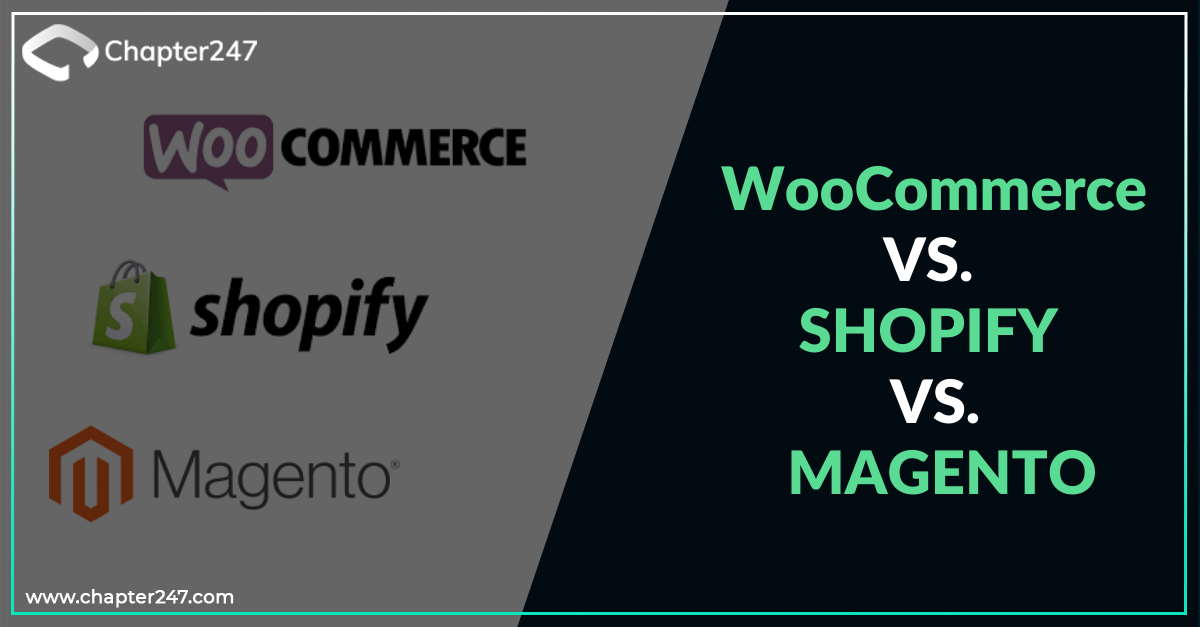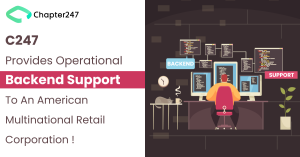E-commerce platforms have started gaining momentum ever since the pandemic struck. E-commerce industry juggernauts like Magento, Shopify, and WooCommerce are leaving no stone unturned to grab their market share and make a stirring impact on the E-commerce business solutions.
The pressing question is which ones the best among the three top players if we are to go for one platform. We understand this is not at all easy because all the three are so popular that they collectively run more than 2.5 million stores!
We give you answers through a detailed review and analysis of these three important E-commerce platforms by comparing their security, performance, user base, reviews, and other important aspects. But before we do that, let us see where each stands in terms of competition.
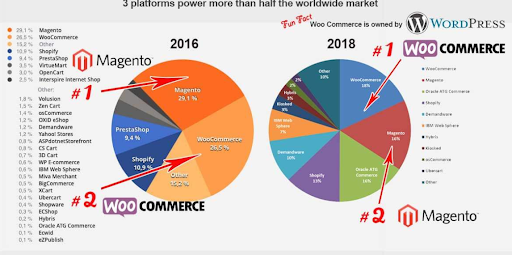
Source: AheadWorks
Magento
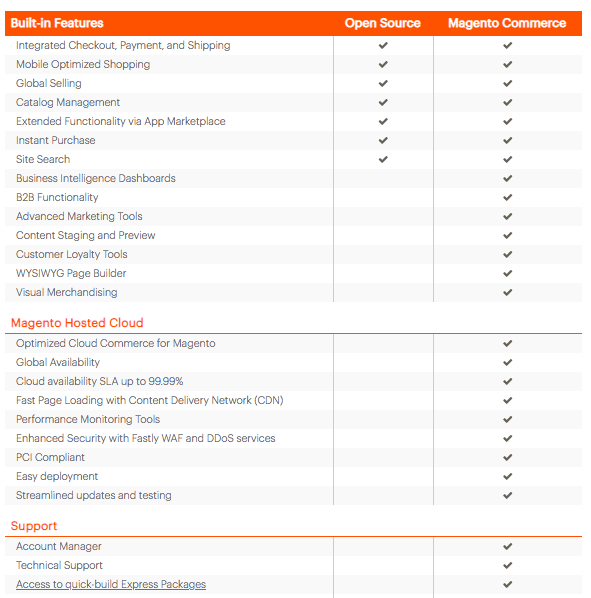
Source: Merchant Maverick
Magento posits itself as a corporate-level-E-commerce platform that offers one of the most robust features and functionalities. Currently in use by more than 250,000 sites, it supports various extensions both paid and free. If you are looking at the community version it requires the website owner to get a domain name and self-hosting. Magento boasts of advanced security features and patches to shut off any vulnerabilities midway. Presently the platform offers 2 editions – Magento open-source edition and Magento commerce edition. When it is the question of performance, stability, and security, Magento has gained the trust of millions already.
WooCommerce
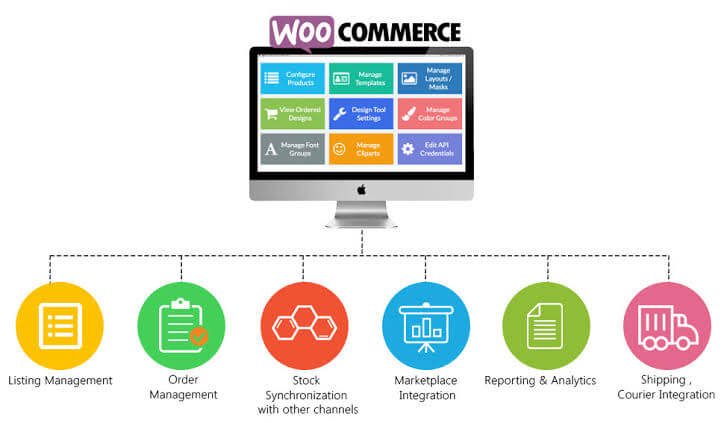 Source: EasyOffice
Source: EasyOffice
WooCommerce is an open-source E-commerce platform that is built on top of WordPress. It functions as a WordPress plugin enabling a smoothly functional online store. Currently in use by more than 2,000,000 sites, its software is absolutely free of cost. It includes SSL support and includes the requisite security features to protect your store. It can be easily integrated with Google Analytics using another plugin too. Given its benefits, it is one of the most utilized and efficient platforms. For merchants who are not looking at spending a fortune can use this as an affordable option.
Shopify
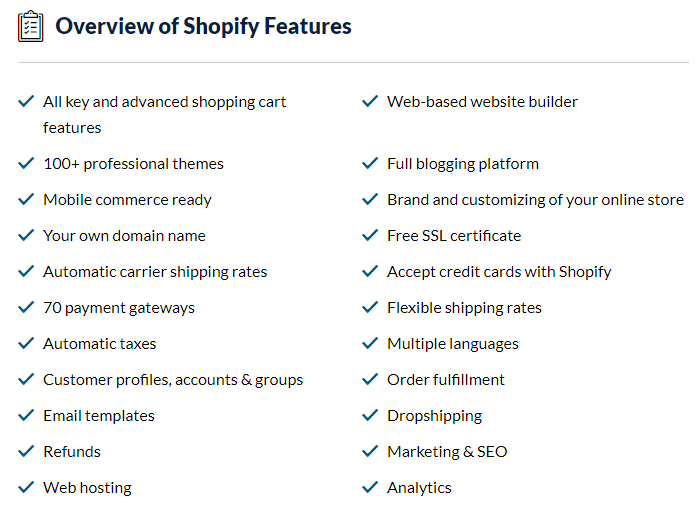
Source: Finances online
This is an all-in-one-e-commerce platform allowing you to create online stores and handle even bulk-sized orders within a single dashboard. It is presently used by over 270,000 merchants and features its own analytics system with confirmed integration with Google Analytics. For those users who do not want to face a complex setup process, Shopify is a smooth ride for sure. Shopify gives full control over your website coding. It is preferred by business owners because of its efficacious functionalities. It has also recently integrated with Amazon allowing merchants to sell products on Amazon through Shopify Admin Panel.
Which one to choose
We just hope our comparison answers the questions for you. We have compared keeping in mind parameters that will make it easily understandable.
Functionality
- Magento can integrate channels meaning that with a single platform it can sell to both consumers and businesses. It lets the merchants assimilate ERP, PWA studio, order management, BI, and many more crucial business factors. It is open and customizable which allows users to deploy cloud to improve its performance and integrate the APIs.
- WooCommerce possesses more than 1000 free plugins and 300 extensions that sufficiently run successful e-commerce businesses. It is free of cost but for the hosting and SSL certificate which are a tad expensive to pay for. Its functionalities include listing management, reporting, and analytics, marketplace integration, and even order management. Other attractive functionalities list as coupon system, payment gateway, delivery settings with several extensions and templates.
- Shopify can auto calculate shipping prices and it is one platform that can be integrated with Social media like FB to set up your shopping page. It also allows for drop-shipping to run your store without building pressure for inventory management. To derive the best benefits out of it, Shopify allows for expert patterns in marketing and programming so that you can consult the right person for the right job to amplify the overall store performance.
SEO
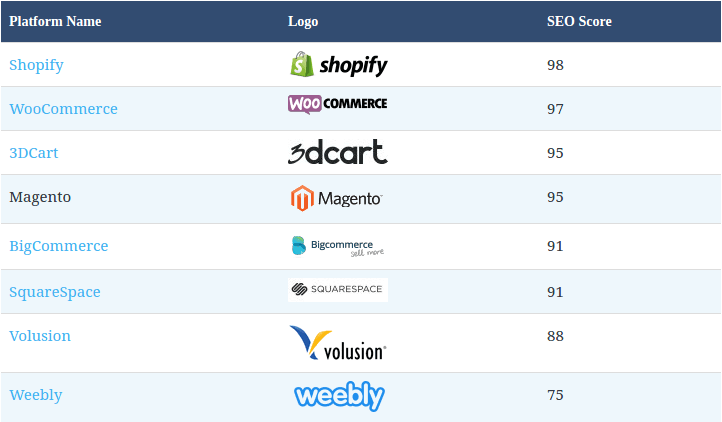
Source: Shopping Cart Migration
- As can be seen from the above illustration, Magento platform boasts of an SEO score between 90 – 95 which is exceptional. The main reason for this high-scored performance is its bent towards being highly SEO optimized right from the start. Magento offers many SEO settings like meta tags optimization, edit robots.txt file, image optimization, tags, etc.
- WooCommerce platform scores second on the chart. With an amazing range of plugins and customization, it has been tagged as an SEO-friendly platform. Since it has been built on top of WordPress, the SEO options it offers are unimaginable. The SEO score is a huge 97%!
- Shopify is the leader of the pack with a monstrous score of 98. It has everything you can think of like Title tags, meta tags, ALT tags, image optimization, page URLs optimization, and the list goes on.
User-friendliness
- Compared to its earlier versions, the all-new immaculate version of Magento is quite easy-to-understand and more user-friendly. It has a seamless use pattern whether you are a tech geek or simply an individual who is in the learning mode.
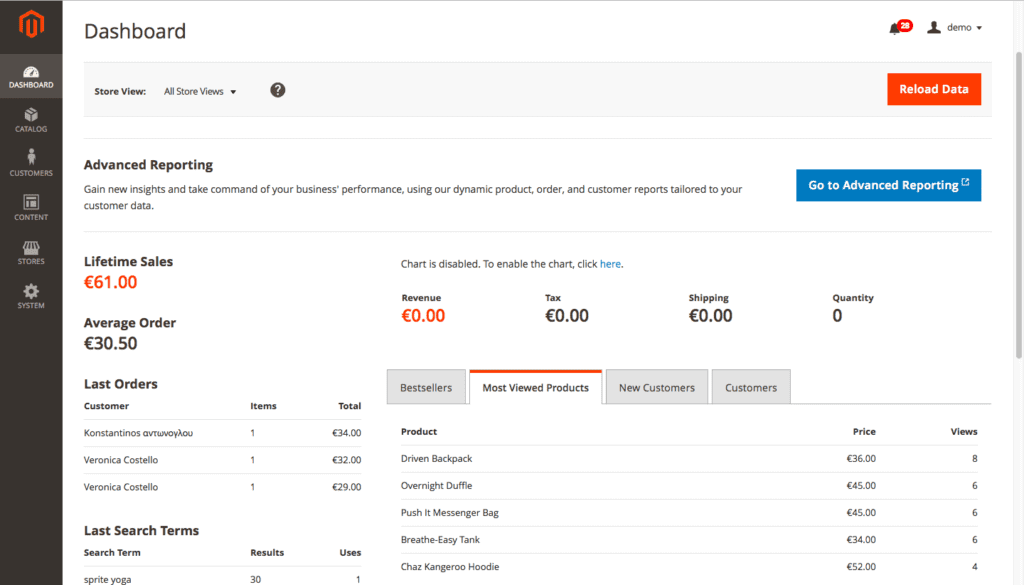
Source: Merchant Maverick
- WooCommerce is brilliant with its par-excellence user-friendliness because it is a plugin. But WooCommerce has its own challenges like it is very difficult to configure the store settings. But when it comes to ease-of-use, it is better than Magento and Shopify. Its powerful interface assists in the user-experience worth reckoning.
- Shopify is one of the most user-friendly e-commerce platforms. It’s easy drag and drop options, easy to edit theme features allow for creating a great user experience. Its platform is absorbing with an easy to navigate admin panel. Users are surely in for a treat with an engulfing shopping experience on stores made on this platform.
Security and overall performance
The Magento version 2.3 has noteworthy security features and performance rendering worth. The new versions have undergone transformations in terms of a number of security transitions and up-gradation. Its new security features are:
- The all-new Recaptcha and an amplified library support
- Its password encryption is much better than it used to be
- Its cross-site scripting is much better
With its new efficiencies and enhancements, now deriving maximum stability and efficiency from the platform. It has really worked hard in collaborating features that boost augmented retention of shipping and billing data, a superior page load optimization, and an improved address system. So, with Magento, you are assured about
In a nutshell, you don’t have to worry a bit about the security and performance aspects if you are choosing the latest instance of Magento for running your e-commerce store.
- WooComemrce has worked its way up on security and performance features. It has several security functionalities that protect merchant information and other important data wide from the public eye. Despite the commendable security measures, there are still several vulnerabilities and errors which are rectifiable only when dealt with in the initial stage.
- Shopify is another top-notch ecommerce platform that is considered as the most secure places by many merchants. A recent research also placed Shopify amongst the safest and the most secure of all platforms by those merchants who have used it. In terms of security it has garnered rave reviews and has consistently secured 5 star rating on prominent platforms.
Customer service
- Customer support in the case of Magento varies with its version. The Magento open-source version’s customer support and service is different from that of Magento commerce edition. The community edition is absolutely free to download but its customer support is nothing to brag about. They do not get full-fledged support but in its developer’s forum they can find every relevant information. The enterprise edition is promising in terms of customer support because it currently offers par excellence customer support. For the open-source edition we recommend you to consult our competent developers to take care of your platform security and maintenance as Magento will not provide any external support.
- WooCommerce also thrives on limited support for the WooCommerce e-commerce edition. Users can raise their concerns to the WooCommerce support and also can lay their hands on source code. You can also submit a user support ticket for WooCommerce to handle all the critical issues for you.
- Shopify leads in terms of customer support and has a great upper hand among all its competitors. It provides a 24/7 window to support its customers giving users the relief to connect with the Shopify support team through phone, email, chat and even social media channels. It also goes one step ahead to provide advice to the users on platform maintenance and guidance to ensure that the functioning is free from glitches.
Pricing plans
There are two options given by Magento as discussed earlier namely Community Edition and Enterprise Edition. The community or the open-source edition is free to download and also use. But the open-source edition is preferable for small-scale businesses and not for those businesses which are larger and complex in applications. For complex editions, we recommend going for enterprise edition and the pricing also depends on the size of your business. There will be hosting charges and plugin charges apart from the platform costs. These plugins can be integrated later to heighten the performance of your e-commerce platform. Overall we believe that Magento presents a budget-friendly fare.
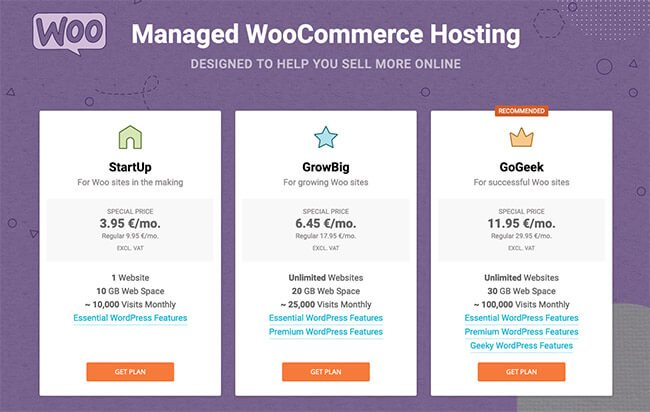
Source: WooCommerce
WooCommerce has a competitive cost-structure as can be seen from the display above. The cost structure is competitive but the plugins and SSL certificate will have extra charges. The official price of WooCommerce extension is $29.
Shopify offers a 14-day free trial so that users can get conversant with the Shopify platform. The best part about the free-trial period is that users need not feed any payment information to use it. The amount is worth investing considering that Shopify offers different pricing plans to suit different needs.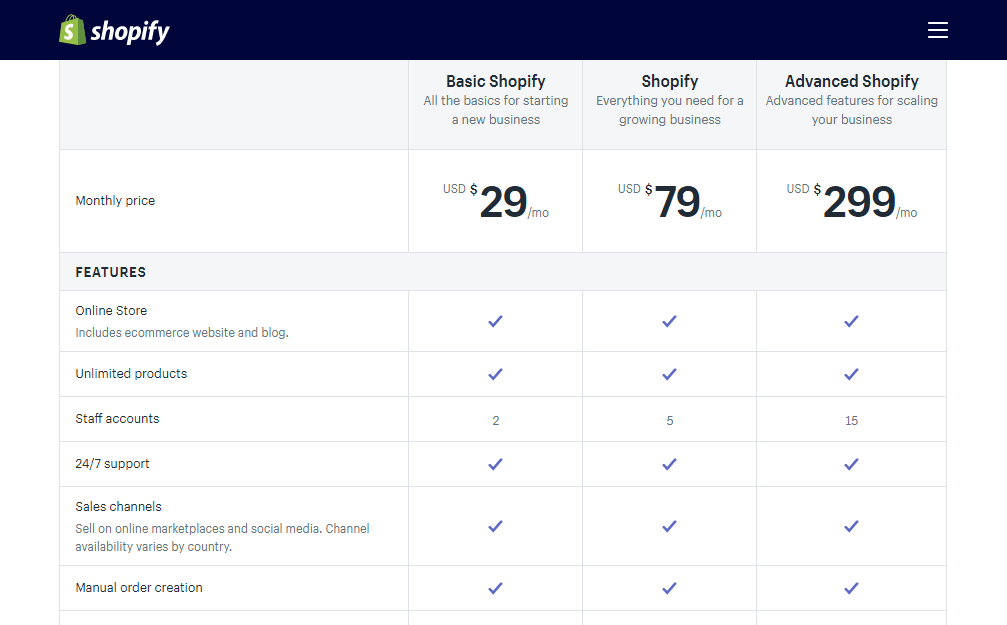 Source: Shopify
Source: Shopify
While every E-commerce platform has its own pros and cons, we do hope that our meticulous analysis has helped you understand which parameters you should be considering before going for your retail and marketplace solution.
For more on these platforms, our experts are waiting to hear from you.


